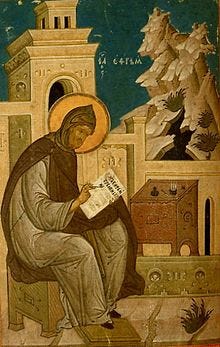“No one is truly poor but except the one who lacks the truth.”
St. Ephraim the Syrian
James 3:1-10
Brethren, let not many of you become teachers, for you know that we who teach shall be judged with greater strictness. For we all make many mistakes, and if any one makes no mistakes in what he says he is a perfect man, able to bridle the whole body also. If we put bits into the mouths of horses that they may obey us, we guide their whole bodies. Look at the ships also; though they are so great and are driven by strong winds, they are guided by a very small rudder wherever the will of the pilot directs. So the tongue is a little member and boasts of great things. How great a forest is set ablaze by a small fire! And the tongue is a fire. The tongue is an unrighteous world among our members, staining the whole body, setting on fire the cycle of nature, and set on fire by hell. For every kind of beast and bird, of reptile and sea creature, can be tamed and has been tamed by humankind, but no human being can tame the tongue–a restless evil, full of deadly poison. With it we bless the Lord and Father, and with it we curse men, who are made in the likeness of God. From the same mouth come blessing and cursing. My brethren, this ought not to be so.
Mark 11:11-23
At that time, the Lord entered Jerusalem, and went into the temple; and when he had looked round at everything, as it was already late, he went out to Bethany with the twelve. On the following day, when they came from Bethany, he was hungry. And seeing in the distance a fig tree in leaf, he went to see if he could find anything on it. When he came to it, he found nothing but leaves, for it was not the season for figs. And he said to it, “May no one ever eat fruit from you again.” And his disciples heard it. And they came to Jerusalem. And he entered the temple and began to drive out those who sold and those who bought in the temple, and he overturned the tables of the money-changers and the seats of those who sold pigeons; and he would not allow any one to carry anything through the temple. And he taught, and said to them, “Is it not written, ‘My house shall be called a house of prayer for all the nations’? But you have made it a den of robbers.” And the chief priests and the scribes heard it and sought a way to destroy him; for they feared him, because all the multitude was astonished at his teaching. And when evening came they went out of the city. As they passed by in the morning, they saw the fig tree withered away to its roots. And Peter remembered and said to him, “Master, look! The fig tree which you cursed has withered.” And Jesus answered them, “Have faith in God. Truly, I say to you, whoever says to this mountain, ‘Be taken up and cast into the sea,’ and does not doubt in his heart, but believes that what he says will come to pass, it will be done for him.he Lord said to them, “Whoever divorces his wife and marries another, commits adultery against her; and if she divorces her husband and marries another, she commits adultery.” And they were bringing children to him, that he might touch them; and the disciples rebuked them. But when Jesus saw it he was indignant, and said to them, “Let the children come to me, do not hinder them; for to such belongs the kingdom of God. Truly, I say to you, whoever does not receive the kingdom of God like a child shall not enter it.” And he took them in his arms and blessed them, laying his hands upon them.
Venerable Ephraim the Syrian
Saint Ephraim the Syrian, a teacher of repentance, was born at the beginning of the fourth century in the city of Nisibis (Mesopotamia) into the family of impoverished toilers of the soil. His parents raised their son in piety, but from his childhood he was known for his quick temper and impetuous character. He often had fights, acted thoughtlessly, and even doubted God’s Providence. He finally recovered his senses by the grace of God, and embarked on the path of repentance and salvation.
Once, he was unjustly accused of stealing a sheep and was thrown into prison. He heard a voice in a dream calling him to repent and correct his life. After this, he was acquitted of the charges and set free.
To continue reading click: Venerable Ephraim the Syrian
The Joy of the Kingdom
We cannot answer the world's problems by adopting towards them an attitude either of surrender or of escape. We can answer the world's problems only by changing those problems, by understanding them in a different perspective. What is required is a return on our part to that source of energy, in the deepest sense of the word, which the Church possessed when it was conquering the world. What the Church brought into the world was not certain ideas applicable simply to human needs, but first of all the truth, the righteousness, the joy of the Kingdom of God.
The joy of the Kingdom: it always worries me that, in the multi-volume systems of dogmatic theology that we have inherited, almost every term is explained and discussed except the one word with which the Christian Gospel opens and closes. "For behold, I bring you tidings of great joy" (Luke 2:10) - so the Gospel begins, with the message of the angels. "And they worshiped Him and returned to Jerusalem with great joy" (Luke 24:52) - so the Gospel ends. There is in fact no theological definition of joy. For we cannot define that sense of joy which no one can take away from us, and at this point all definitions are silent. Yet only if this experience of the joy of the Kingdom in all its fullness is again placed at the center of theology, does it become possible for theology to deal once more with creation in its true cosmic dimensions, with the historic reality of the fight between the Kingdom of God and the kingdom of the prince of this world, and finally with redemption as the plenitude, the victory and the presence of God, who becomes all in all things.
What is needed is not more liturgical piety. On the contrary, one of the greatest enemies of the Liturgy is liturgical piety. The Liturgy is not to be treated as an aesthetic experience or a therapeutic exercise. Its unique function is to reveal to us the Kingdom of God. This is what we commemorate eternally. The remembrance, that anamnesis of the Kingdom, is the source of everything else in the Church. It is this that theology strives to bring to the world. And it comes even to a "post-Christian" world as the gift of healing, of redemption and of joy.
This week’s calendar reminders:
Monday 1/27: Matins 8:30 am
Tuesday 1/28: no services or events
Wednesday 1/29: no services or events
Thursday 1/30: Matins 8:30 am
Friday 1/31: Matins 8:30 am
Saturday 2/1: Catechumen Class 4:30; Choir Rehearsal 5 pm; Great Vespers 6 pm
Sunday 2/2: Divine Liturgy 9:15am
CLICK BELOW to donate online:
Christ the Savior Orthodox Church is located in Southbury, Connecticut, and is part of the New England Diocese of the Orthodox Church of America.
Mailing address: Christ the Savior Church, 1070 Roxbury Road, Southbury, CT 06488
PLEASE DONATE to help our parish do the work of the Lord, thrive and grow, and extend the Kingdom of God. May the Lord bless your generosity!
Fr. Moses Locke can be reached at frmoseslocke@gmail.com











